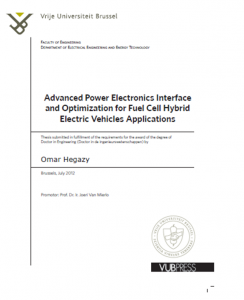
Due to rising concerns about environmental issues, such as climate change and urban pollution, as well as energy issues, automobile manufacturers are being forced to shift their attention towards clean vehicle technologies. Electric Vehicles (EVs), Hybrid Electric Vehicles (HEVs), Plug-in Hybrid Electric Vehicles (PHEVs) and Fuel Cell Hybrid Electric Vehicles (FCHEVs) are more energy efficient and cleaner than conventional vehicles. FCHEVs and their plug-in configurations (called “PFCHEVs’) can be considered interesting alternatives to conventional vehicles. The FCHEVs and PFCHEVs comprise a fuel cell (FC), energy storage systems (ESS), such as batteries and supercapacitors, power electronics interfaces (such as DC/DC converters, DC/AC inverter andon-board battery charger) and an electric motor. In particular, the power electronics interfaces and control strategy play an important role in the development of FCHEVs and PFCHEVs. In this dissertation, novel Multi-Device Interleaved Boost Converter (MDIBC) has been proposed for FCHEVs in order to optimize the drive system. The proposed converter improves efficiency, reduces current and voltage ripples, and reduces the size of the passive components, leading to a high reliability compared to other DC/DC converters. The proposed converter (MDIBC) is experimentally validated with results obtained from a 30 kW prototype. In the framework of this dissertation, new Multiple-Input Converter (MIC) concepts have been proposed in order to integrate multiple-input DC sources (such as fuel cell, battery and supercapacitor) together with a common DC-Link that are used in FCHEVs. The proposed concepts are promising from the viewpoints of low cost, compact packaging, reliability and centralized control requirements. During this PhD work, innovative Eight-Switch Inverter (ESI) has been designed and experimentally implemented in a 30 kW prototype in order to integrate the DC/AC inverter and on-board battery charger in one power electronics interface. The proposed converter is compact and shows high performance in on-board battery chargers and inverters in PFCHEV powertrains. In this dissertation, new integrated power electronics interfaces (IPEIs) are proposed and tested in order to realize the integration of the DC/DC converter, on-board battery charger and DC/AC inverter together in the PFCHEV powertrain. Finally, from the point of view of the control strategy, a methodology based on particle swarm optimization (PSO) is proposed for FCHEVs in order to achieve the optimal powertrain sizing as well as the optimal power sharing between multiple energy sources. The advanced power electronics interfaces and control strategies, which have been proposed in this dissertation, can be considered as a step forward towards launching new generations of vehicles.
Promotor: Prof. Dr. Joeri Van Mierlo
Committee members: Prof. Maarten Kuijk (ETRO-VUB), Prof. Rik Pintelon (ELEC-VUB), Prof. Peter Van den Bossche (VUB), Prof. Alex Van den Bossche (Ghent University), Prof. Johan Gyselinck (ULB), Prof. Philippe Lataire (VUB)
